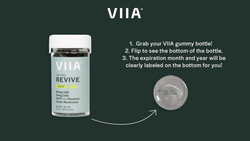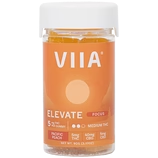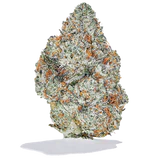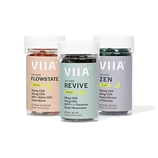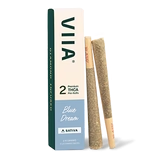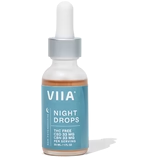 thca
thcaWhat is Delta 10 THC?
Delta-10 THC is a variant of delta-9 THC, the primary compound in cannabis that affects mental state. Isomers like delta-10 and delta-9 THC share the same molecular formula but have different atomic arrangements, resulting in distinct chemical and physical properties.
You may be familiar with delta 9, the most popular form of THC that birthed cannabis culture. Delta 8 is lesser-known, but many are familiar with its milder effects.
Delta 10 THC is considered the least potent of the three “Delta molecules,” offering a milder psychoactive experience suitable for a broad audience. Although research on this intriguing cannabinoid is limited and product availability remains scarce, we have compiled a comprehensive overview of its origins, effects, and potential benefits.
Where Does Delta 10 THC Come From?
Interestingly, the discovery of delta-10 THC was a bit of an accident. It's believed that a batch of CBD that was being isomerized to create delta-8 THC was unintentionally contaminated with fire retardant, which formed unique crystals that were originally thought to be CBC (cannabichromene) and CBL (cannabicyclol).
After some research, the Fusion Farms team in California identified the compound as delta 10 THC.
Delta 10 THC is found naturally in the hemp plant but in such small quantities that it's not feasible to extract directly in large amounts. Instead, most delta 10 products are created by taking CBD or delta 9 THC and putting it through a chemical process called "isomerization," which converts the cannabinoids.
The Isomerization Process
Here’s how it works: CBD isolated from hemp is dissolved in a solvent, often something like heptane. This solution is then subjected to a process called "isomerization" where it is treated with an acid, commonly a type of Lewis acid like aluminum chloride, under heat for an extended period.
The acid acts as a catalyst, rearranging the molecular structure of CBD and converting it into delta-10 THC, as well as other byproducts like delta-8 THC and delta-9 THC.
After the isomerization process, the mixture is neutralized, the solvent is evaporated, and the various cannabinoids are separated and purified using chromatography.
The end result is a concentrated form of delta-10 THC. You can learn more about the isomerization process in this study [1], which discusses why CBD “degrades” to psychotropic products when exposed to acid treatment.
Isomerization involves solvents and acids to create a controlled chemical reaction that converts CBD into delta-10. The resulting product is then purified to remove all traces of solvents, ensuring a clean and safe final product.
Is Delta 10 Psychoactive?
Yes, delta 10 THC is psychoactive with the potential to get you high, but there isn’t any definitive research on its potency yet. Anecdotally, it's said to be about half as potent as delta 9, and less intense than delta 8. Users also report less of a full body high and more of a head buzz when using delta 10, as well as sativa-like effects versus a sleepy indica experience.
This also means that delta 10 THC can trigger a positive drug test. Since most modern drug tests don’t distinguish between THC isomers, you may end up with a positive result for delta 9 THC, for example.
If you’re subject to drug testing, we suggest avoiding delta 10 and other THC products altogether.

How Does Delta-10 THC Work in the Body?
While there isn't enough research yet to confirm the specifics of how delta 10 THC interacts with the body, we can assume it functions similarly to delta 9 and delta 8 THC. These cannabinoids interact with the body's endocannabinoid system (ECS), which plays a role in regulating various functions such as mood, appetite, pain sensation, and memory.
The ECS consists of three main components: endocannabinoids (cannabinoids produced naturally by the body), receptors that the cannabinoids bind to, and enzymes that break down the cannabinoids.
The two primary receptors are CB1, which is mostly found in the central nervous system, and CB2, which is mostly found in the peripheral nervous system, especially immune cells.
Studies show that when THC enters the body, it binds to these cannabinoid receptors — particularly CB1 receptors — in the brain [2], activating them and impacting certain mental and physical functions, including:

-
Mood: THC can affect mood by interacting with the brain's reward system, leading to an increase in dopamine release. This can result in feelings of euphoria and relaxation. However, in some cases, it can also cause anxiety or paranoia.
-
Appetite: CB1 receptors are present in parts of the hypothalamus that regulate appetite. When THC activates these receptors, it can stimulate hunger, often referred to as "the munchies."
-
Pain: THC can reduce pain perception by interacting with CB1 receptors in pain-regulating areas of the brain and spinal cord. It can also reduce inflammation, a common cause of pain, via interaction with CB2 receptors in immune cells.
- Memory: THC can also affect your memory by disrupting the normal functioning of the hippocampus, a brain area critical for memory formation. This can lead to short-term memory impairment while under the influence. Studies performed on rats showed adverse effects on memory [3], and a reduced hippocampal volume in long-term cannabis users [4].
What Does Delta 10 THC Feel Like?
Delta-10 THC produces feelings of euphoria and relaxation, similar to Delta-9 THC. However, because it's much weaker, there's a lower chance of accidentally taking too much and experiencing the side effects associated with THC, such as nervousness and paranoia. This makes Delta-10 a popular choice for micro-dosing, allowing you to experience the benefits of THC without the intense psychoactive effects.
Comparing Delta-8, Delta-9, and Delta-10 THC
Delta-8, Delta-9, and Delta-10 THC are all forms of tetrahydrocannabinol, the primary psychoactive compound found in cannabis. These compounds are otherwise known as THC isomers, with their differing structures delivering unique experiences. While they share similarities, there are notable differences in their potency, effects, and legal status. Here’s a rundown of how these three isomers compare and contrast:
Delta-10 THC
Delta-10 THC is the least potent of the three, offering the mildest psychoactive experience. It's known for producing a more energizing and uplifting effect, making it popular for daytime use and creative pursuits. Due to its lower potency, Delta-10 THC also has a lower risk of causing negative side effects like paranoia or anxiety compared to Delta-9 THC.
Delta-9 THC
Delta-9 THC is the most well-known and potent form of THC, responsible for the classic "high" associated with marijuana use. It binds strongly to the CB1 receptors in the brain, resulting in more intense psychoactive effects.
Delta-8 THC
Delta-8 THC is an isomer of Delta-9 THC, meaning it has the same chemical formula but a slightly different structure. This difference in structure makes Delta-8 THC less potent than Delta-9, typically producing milder psychoactive effects, less anxiety, and a clearer-headed high.
Is Delta-10 THC Legal?
Delta-10 THC is technically legal as long as it abides by the Farm Bill, maintaining less than 0.3% THC concentration and coming from hemp. However, some states consider Delta-10 to be a synthetic cannabinoid because of the isomerization process used to create it. As a result, several states have moved to ban the sale of THC analogs, including Delta-8, Delta-10, and hemp-derived Delta-9 THC. The states where Delta-10 is illegal include Alaska, Arizona, Arkansas, Colorado, Delaware, Idaho, Iowa, Mississippi, Montana, and Utah.
Ways to Consume Delta 10 THC
Delta-10 THC can be consumed in various forms, each with its own unique benefits and onset times. The most common ways to consume Delta-10 THC include:
- Edibles: Delta-10 THC edibles, such as gummies or baked goods, offer a convenient and discreet way to consume the cannabinoid. Edibles have a slower onset time (30-90 minutes) but provide longer-lasting effects (4-8 hours) compared to other methods.
- Vapes: Delta-10 THC vape cartridges and disposable vape pens allow for fast-acting effects, as the cannabinoid is absorbed directly into the bloodstream through the lungs. The effects of vaping are typically felt within minutes and can last for 2-4 hours.
- Tinctures: Delta-10 THC tinctures are liquid extracts that can be consumed sublingually (under the tongue) or added to food and beverages. Sublingual administration offers a faster onset time than edibles (15-30 minutes) and longer-lasting effects than vaping (4-6 hours).
When choosing a Delta-10 THC product, it's essential to purchase from reputable brands that provide third-party lab testing to ensure purity, potency, and the absence of harmful contaminants — which is exactly what you can expect from VIIA.
Is Delta 10 THC Safe?
As a relatively new discovery compared to other cannabinoids like CBD and Delta-9 THC, there isn't much research on Delta-10 THC yet. This means we can't definitively confirm its safety and potential uses for wellness. Most of what we know about Delta-10 comes from personal accounts of those who find it to be a useful low-strength alternative to Delta-9 products.
The most important thing when considering Delta-10 THC is to purchase products from reputable brands who can provide third-party testing to show that the product is clean and free from solvents and acids. At VIIA, for example, we post third-party test results on our website to ensure a high quality product, and for your peace of mind.
Side Effects of Delta 10 THC
The side effects of Delta-10 THC are similar to those of Delta-9 THC, including dry eyes, dehydration, increased heart rate, altered perception of time, increased sensory sensitivity, and increased appetite. However, because Delta-10 is less potent, these side effects may be less pronounced or less likely to occur.
Will Delta-10 THC Show Up on A Drug Test?
Yes, Delta-10 THC will show up on a drug test. Drug tests don't differentiate between the various types of THC; they simply test for the presence of THC metabolites in the body. If you're subject to drug testing, it's best to avoid Delta-10 THC and other THC products altogether.
The Takeaway: What is Delta-10 THC?
Delta-10 THC is a unique cannabinoid that offers a milder psychoactive experience compared to Delta-8 and Delta-9 THC. If you’re looking for a less intense experience, its lower potency and uplifting effects make it an attractive alternative to conventional THC products. However, there’s minimal research on Delta-10 when compared to Delta-8 and Delta-9 THC, highlighting the importance of buying from a trusted, third-party tested source.
At VIIA, we offer a range of high-quality, hemp-derived products that are always third-party tested and updated online. While we don't currently offer Delta-10 THC products, our Delta-8 and Delta-9 THC selection may fit your needs and preferences:
- Day Drift 100mg Delta 9 + HHC Gummies for a balanced, uplifting effect.
- Dreams 10mg THC + CBN Gummies to promote restful sleep.
- Elevate Focus Gummies D9 THC + CBG Gummies for enhancing mental. sharpness and boost creativity.
- High Love Libido Gummies (5mg) to enhance intimacy and arousal.
Whether you're interested in exploring Delta-10 THC or other hemp-derived cannabinoids, VIIA is committed to providing top-quality products that empower you to enhance your everyday experiences. As always, we encourage responsible consumption and recommend starting with low doses to find the perfect fit for your individual needs and goals.
FAQs
What is Delta-10 THC?
Delta-10 THC is a minor cannabinoid found in hemp plants that offers a unique, mild psychoactive experience.
Is Delta-10 THC legal?
Delta-10 THC is legal under the Farm Bill if it's derived from hemp and contains less than 0.3% THC. However, some states have banned THC analogs, so check your local laws.
How does Delta-10 THC differ from Delta-8 and Delta-9 THC?
Delta-10 THC is less potent than both Delta-8 and Delta-9 THC, offering a milder psychoactive experience with a lower risk of negative side effects.
Will Delta-10 THC show up on a drug test?
Yes, Delta-10 THC will show up on a drug test, as these tests do not distinguish between different types of THC.
What are the effects of Delta-10 THC?
Delta-10 THC can produce feelings of euphoria, relaxation, and increased sensory sensitivity, similar to Delta-9 THC but less intense.
Is Delta-10 THC safe to consume?
More research is needed to fully understand the safety and potential benefits of Delta-10 THC. Always purchase from reputable brands that provide third-party lab testing.
What types of Delta-10 THC products are available?
Delta-10 THC can be found in edibles, vapes, and tinctures, although it's not as widely available as Delta-8 and Delta-9 products.
References
- Golombek, P., Müller, M., Barthlott, I., Sproll, C., & Lachenmeier, D. W. (2020). Conversion of Cannabidiol (CBD) into Psychotropic Cannabinoids Including Tetrahydrocannabinol (THC): A Controversy in the Scientific Literature. Toxics, 8(2), 41. https://doi.org/10.3390/toxics8020041
- Reggio P. H. (2010). Endocannabinoid binding to the cannabinoid receptors: what is known and what remains unknown. Current medicinal chemistry, 17(14), 1468–1486. https://doi.org/10.2174/092986710790980005
- Niloy, N., Hediyal, T. A., Vichitra, C., Sonali, S., Chidambaram, S. B., Gorantla, V. R., & Mahalakshmi, A. M. (2023). Effect of Cannabis on Memory Consolidation, Learning and Retrieval and Its Current Legal Status in India: A Review. Biomolecules, 13(1), 162. https://doi.org/10.3390/biom13010162
- Yücel, M., Lorenzetti, V., Suo, C., Zalesky, A., Fornito, A., Takagi, M. J., Lubman, D. I., & Solowij, N. (2016). Hippocampal harms, protection and recovery following regular cannabis use. Translational psychiatry, 6(1), e710. https://doi.org/10.1038/tp.2015.201



